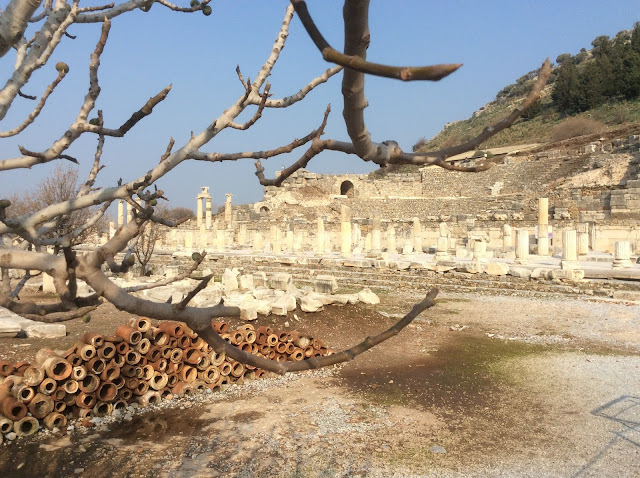What did I enjoy best about my trip to Anatolia, on a
press tour with Medes Tour Travel? I have no doubt: it
was my excursion to Ephesus ancient city. The ruins attract
thousands of tourists every day. Official data report that in 2014 about 3
millions people walked through the gates of the ancient city. But I was lucky
enough to visit it in winter and found it not too crowded.
Such a wonderful place to be! Historians say first constructions go back to the 10th century BC. It then came
under control of the Romans in 129 B. C. By this time, Ephesus
was a successful sea trading port and centre of excellence for
politics and philosophers. It was also destineted to be historically known as one of the Seven Churches of
Revelation as mentioned in the Bible.
As soon as I got in, I took a quick glimpse around.
There was so much to fulfill the eyes. First thing I could see was the
Basilca Stoa: really impressive. I noticed also the aqueduct. Ruins
have special inhabitants that are cats. I took lot of pictures with
them and I would like to show you at least one of them. I met a beautiful theatre on my
way, but it is not the huge one, that will come afterwards. Walking
step by step I arrived at the gate of the ancient city of Ephesus. It is where Curetes
Street starts.
The Curetes Street does not follow the
orthogonal street grid of the Hellenistic-Roman city, The 210 meters long main boulevard was prestigiously equipped with
porticoes and marble paving in the early Imperial period. A sewer channel ran
under the wide street. The shops lay behind the deep porticoes in which
tradesmen, artisans and innkeepers offered their goods and services. Along the
street, an inscribed base supporting a marble or bronze statue stood in front
of each column; on these, the good deeds of citizens and benefactors were
honoured.
The steep street (with a difference in elevation of ca. 20 meters) was finally closed to the traffic through the “Heracles Gate” built in the late antique period. Maintenance repairs continued well into the 6th /7th centuries A.D. It is really magnificent and wil take you just in front of the Celsus Library.
The steep street (with a difference in elevation of ca. 20 meters) was finally closed to the traffic through the “Heracles Gate” built in the late antique period. Maintenance repairs continued well into the 6th /7th centuries A.D. It is really magnificent and wil take you just in front of the Celsus Library.
The Celsus Library, certainly the most well-known
monument in Ephesus, was built between A.D. 100 and 110 by Gaius Iulius Aquila
for his father the senator Tiberius Julius Celsus Polemaenus The library can
actually be interpreted as a herron which was built over the burial chamber of
the deceased. A flight of nine steps at the façade, flanked by statue bases,
led to a vestibule from which the actual library room could be entered.
The architecture of the impressive façade contrasts with the brick construction of the building’s interior, although the floors and walls were revetted with marble. The library was destroyed during the earthquake in ca. A.D. 270 and was rebuilt. In the late antique period the remnants of the splendid façade served as the rear wall of a street fountain. The re-erection took place during the years 1970-1978 with the financial help of Anton Kallinger-Prskawetz.
The architecture of the impressive façade contrasts with the brick construction of the building’s interior, although the floors and walls were revetted with marble. The library was destroyed during the earthquake in ca. A.D. 270 and was rebuilt. In the late antique period the remnants of the splendid façade served as the rear wall of a street fountain. The re-erection took place during the years 1970-1978 with the financial help of Anton Kallinger-Prskawetz.
Hundreds of selfies are taken here every day: I think
it is one the most photographed monument in Turkey.
Strolling around the ruins I noticed the Nike Goddess,
the winged goddess of victory. Estimations say that about 24,000 people could sit in
the Grand Theatre of Ephesus. It is such an impressive space!
The Great Theatre goes back to a preceding structure of the Hellenistic period (3nd and 1st century B.C). In the Roman period there was an extensive rebuilding under the Emperors Domitian (A.D. 81-96) and Trajan (A.D. 98-117) with at first a two-, and later a three-storeyed impressive façade. Historians report that, in addiction to theatre performances, assemblies also took place here.
In the later Imperial period, gladiatorial contests are also attested. Before the 7th century the Grand Theatre was incorporated into the Byzantine city walls and remained as you can see it now. A man from the USA just started singing aloud while I was visiting the Grand Theatre, so I noticed the acoustics of the place is excellent.
This is such a beautiful archeological site that I think I could visit it twice and don't get bored. I highly suggest to pay a visit. Please contact Medes Tour Travel if you need help planning your travel to Turkey.












Nessun commento:
Posta un commento